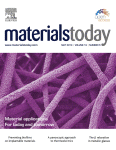
Materials Today
Scope & Guideline
Fostering Collaboration in the World of Materials
Introduction
Aims and Scopes
- Synthesis and Characterization of Advanced Materials:
The journal publishes research on novel methods for synthesizing materials, including nanomaterials, polymers, and composites, as well as innovative characterization techniques that elucidate the properties and behaviors of these materials. - Functional Applications in Biomedical Engineering:
A significant focus of the journal is on the application of materials in biomedical engineering, including drug delivery systems, tissue engineering scaffolds, and anti-cancer therapies, emphasizing how material properties can enhance therapeutic efficacy. - Energy Storage and Conversion Technologies:
Research related to materials used in energy storage (like batteries and supercapacitors) and conversion (such as photocatalysts for hydrogen production) is prominently featured, highlighting sustainable materials and their role in addressing energy challenges. - Nanotechnology and Nanomaterials:
The journal emphasizes the development and application of nanomaterials, including their use in sensors, drug delivery, and environmental remediation, showcasing their unique properties and potential for innovation. - Sustainable and Green Materials:
Materials Today promotes research on environmentally friendly materials and processes, including biodegradable polymers and sustainable manufacturing techniques, focusing on the reduction of environmental impact in materials science. - Responsive and Smart Materials:
The exploration of materials that can respond to external stimuli (such as temperature, pH, or light) is a vital area, showcasing advancements in smart materials for applications in sensors, actuators, and advanced manufacturing.
Trending and Emerging
- Biomaterials and Tissue Engineering:
Research focusing on biomaterials for medical applications, particularly in tissue engineering and regenerative medicine, is rapidly increasing. This includes studies on hydrogels, scaffolds, and drug delivery systems designed for enhanced biological compatibility and function. - Machine Learning and Computational Materials Science:
The integration of machine learning techniques in materials design and discovery is becoming a prominent theme, with studies aimed at optimizing material properties and accelerating the development of new materials through computational approaches. - Metal-Organic Frameworks (MOFs):
There is a growing interest in MOFs for a variety of applications, including gas storage, catalysis, and environmental remediation. Research is increasingly exploring their multifunctionality and adaptability in diverse fields. - Sustainable Materials and Green Chemistry:
The emphasis on sustainability is evident, with an increase in studies focusing on biodegradable materials, recycling processes, and green synthesis methods aimed at minimizing environmental impact. - Nano- and Micro-Scale Materials:
Research on materials at the nano and micro-scale, particularly those with unique electronic, optical, and mechanical properties, is trending. This includes studies on nanosensors, nanocomposites, and their applications across various industries. - Smart and Responsive Materials:
The development of materials that can respond to environmental stimuli (such as temperature, light, or moisture) is on the rise, with applications in sensors, actuators, and self-healing materials being increasingly explored.
Declining or Waning
- Traditional Manufacturing Techniques:
There has been a noticeable decline in papers focusing on conventional manufacturing methods, such as bulk metal fabrication and standard polymer processing techniques, as the field shifts towards additive manufacturing and advanced fabrication methods. - Basic Materials Science without Application Focus:
Research that solely addresses basic materials science principles without a clear application or innovation aspect is becoming less prevalent, as the journal increasingly prioritizes studies with practical implications and technological advancements. - Single-component Material Studies:
The trend is moving away from studies focusing on single-component materials towards more complex systems, including hybrid and composite materials that leverage synergies between different material types for enhanced performance. - Basic Characterization Techniques:
There is a gradual reduction in publications that primarily discuss traditional characterization methods, as newer, more sophisticated techniques that provide deeper insights into material properties are favored.
Similar Journals
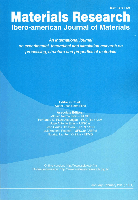
Materials Research-Ibero-american Journal of Materials
Fostering a global community dedicated to materials innovation.Materials Research-Ibero-american Journal of Materials, published by the UNIV FED SAO CARLOS, DEPT ENGENHARIA MATERIALS, is a prominent platform dedicated to advancing the field of materials science. Launched in 1998, this Open Access journal has fostered a culture of inclusive knowledge sharing, allowing researchers and practitioners worldwide to access valuable insights in Condensed Matter Physics, Materials Science, Mechanical Engineering, and Mechanics of Materials. With a commendable Q3 ranking in these diverse categories in 2023, the journal provides a vital resource that bridges theoretical research and practical applications in materials technology. Covering a range of topics from novel material characterization to innovative engineering solutions, Materials Research serves as a critical forum for contributors across the globe, particularly those in Latin America. Researchers, students, and professionals are encouraged to engage with this journal, which operates with a clear commitment to high standards and is based in São Carlos, Brazil, further enhancing its relevance and appeal within the international materials research community.

MACROMOLECULAR RESEARCH
Pioneering Research in Polymer ApplicationsMACROMOLECULAR RESEARCH, published by the POLYMER SOC KOREA, is a premier journal dedicated to advancing the field of macromolecular science and polymer engineering. With its ISSN 1598-5032 and E-ISSN 2092-7673, this journal has emerged as a vital platform for researchers and professionals interested in the application and development of polymers across various domains. Based in South Korea and operating as an open-access resource since its inception in 2002, MACROMOLECULAR RESEARCH consistently ranks in the Q2 category across diverse fields such as Chemical Engineering, Materials Chemistry, and Organic Chemistry as per the latest 2023 metrics. Notably, it is recognized for its substantial contributions to polymery science, increasing its visibility and impact in global research. By providing a forum for original research articles, reviews, and innovative methodologies, this journal aims to foster collaboration and knowledge sharing among scientists, engineers, and students alike. Join a community that is at the forefront of polymer research by exploring the wealth of resources and cutting-edge studies featured in MACROMOLECULAR RESEARCH.

ACS Materials Au
Transforming Ideas into Materials BreakthroughsACS Materials Au, published by the American Chemical Society, is a premier open-access journal that has been at the forefront of materials science since its inception in 2021. With an ISSN of 2694-2461, this journal encompasses an expansive range of topics including biomaterials, electronic, optical and magnetic materials, materials chemistry, and polymers and plastics, consistently achieving Q1 rankings in these categories for 2023. The journal is based in the United States and operates from the AMS's headquarters in Washington, DC, offering significant visibility and a robust platform for researchers. The journal's commitment to open access ensures wide dissemination of groundbreaking research, enabling a diverse audience—including researchers, professionals, and students—to engage with the latest advancements in materials science. With an encouraging impact factor and a focus on novel materials and innovative applications, ACS Materials Au stands as a vital resource for anyone devoted to understanding and advancing the frontiers of materials engineering and science.

ACS Materials Letters
Transforming Ideas into Impactful InnovationsACS Materials Letters is an esteemed peer-reviewed journal published by the American Chemical Society, emphasizing groundbreaking research and advancements in the fields of materials science, biomedical engineering, and chemical engineering. With a robust update and established reputation since its inception in 2019, this journal has rapidly ascended to the top tiers, achieving Q1 rankings in key categories such as Biomedical Engineering, Chemical Engineering (miscellaneous), and Materials Science (miscellaneous) in 2023. The journal boasts impressive Scopus rankings, including #14 in General Chemical Engineering and #19 in Biomedical Engineering, placing it among the elite publications in these domains. While not fully open access, ACS Materials Letters facilitates the dissemination of high-impact research accessible to academics and industry professionals alike. With its comprehensive scope and rigorous selection process, the journal serves as a vital resource for researchers and students eager to stay abreast of the latest innovations and technologies shaping materials science and engineering.

Frontiers of Materials Science
Bridging Academia and Industry through Materials InnovationFrontiers of Materials Science is a groundbreaking journal dedicated to exploring advanced materials and their applications within the ever-evolving landscape of materials science. Published by HIGHER EDUCATION PRESS, this journal offers a crucial platform for scholars and practitioners seeking to disseminate innovative research findings that foster interdisciplinary collaboration. Since its inception in 2011, the journal has enjoyed a notable Q2 ranking in the category of Materials Science (miscellaneous) as of 2023, positioning it among the noteworthy publications in the field with a Scopus rank of #222 out of 463. While predominantly published in China, the journal is committed to open access principles, allowing global accessibility to cutting-edge research. With its comprehensive coverage spanning materials synthesis, characterization, properties, and applications, Frontiers of Materials Science not only serves as a repository for academia but also bridges the gap between research and industry, making it an indispensable resource for researchers, professionals, and students alike.
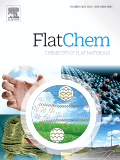
FlatChem
Fostering Global Collaboration in Materials InnovationFlatChem, an esteemed journal published by ELSEVIER, serves as a premier platform for disseminating high-quality research in the dynamic fields of ceramic and composite materials, electronic and optical materials, materials chemistry, and surfaces, coatings, and films. Since its inception in 2017, the journal has garnered a robust reputation, evidenced by its rank in the top quartile (Q1) across multiple categories, including a commendable rank of #25/127 in Ceramics and Composites and #49/284 in Electronic, Optical and Magnetic Materials. With a focus on pioneering advancements and innovative methodologies, FlatChem not only highlights cutting-edge research but also promotes collaboration and knowledge exchange within the scientific community. The journal’s impact is underscored by its impressive rankings in Scopus, marking it as a vital resource for researchers, professionals, and students aiming to stay at the forefront of materials science. As an open-access journal, it ensures that groundbreaking findings are readily accessible, fostering a broader understanding and application of materials innovation worldwide. The journal is based in the Netherlands, with its headquarters located at RADARWEG 29, 1043 NX AMSTERDAM, NETHERLANDS. Join the vibrant community contributing to FlatChem and engage with the forefront of material advancements.
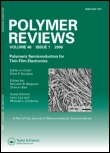
Polymer Reviews
Leading the dialogue in materials engineering.Polymer Reviews, published by Taylor & Francis Inc, is an esteemed journal dedicated to the intricate and evolving field of polymer science. With its ISSN 1558-3724 and E-ISSN 1558-3716, the journal has established a significant presence among researchers and practitioners alike, evidenced by its impressive categorization in the Q1 quartiles across multiple disciplines, including Biomedical Engineering, Materials Chemistry, and Renewable Energy. Since its inception in 2006 and continuing through 2024, Polymer Reviews has consistently aimed to advance the knowledge base of polymer applications and innovations, providing a platform for comprehensive review articles that stimulate further research and inspire practical solutions. The journal, ranking within the top percentile across several Scopus categories, underscores its impact and relevance in a rapidly developing scientific landscape. Though not an open-access journal, it remains a vital resource for those invested in the future of materials science and engineering.
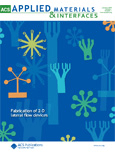
ACS Applied Materials & Interfaces
Transforming Research into Real-World ApplicationsACS Applied Materials & Interfaces, published by the American Chemical Society, stands as a leading journal in the field of applied materials, nanotechnology, and interdisciplinary research in medicine. With an impressive Impact Factor that places it in the Q1 category across Materials Science, Medicine, and Nanoscience and Nanotechnology, this journal consistently ranks among the top tier, evidencing its significance and influence in advancing scientific knowledge. The journal’s scopus ranking of 33 out of 463 in General Materials Science further underscores its critical role in disseminating innovative and high-quality research. Although it is not an open-access journal, a diverse range of access options is available, ensuring that vital research findings are accessible to a broad audience of researchers, professionals, and students. Targeting breakthroughs in the synthesis, characterization, and application of materials and interfaces, ACS Applied Materials & Interfaces serves as a pivotal platform for publishing cutting-edge studies essential for future technological advancements.
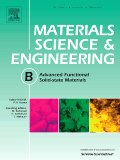
Materials Science and Engineering B-Advanced Functional Solid-State Materials
Exploring Innovations in Functional MaterialsMaterials Science and Engineering B: Advanced Functional Solid-State Materials, published by Elsevier, stands as a pivotal platform in the realm of materials science, focusing on the development and characterization of advanced solid-state materials. With an ISSN of 0921-5107 and E-ISSN of 1873-4944, this journal operates out of the United Kingdom and addresses critical issues in condensed matter physics, mechanical engineering, and mechanics of materials. Its consistent recognition, evident in its Q2 quartile rankings across multiple engineering and physics categories and a respectable scope of convergence from 1988 to 2024, signifies its substantial contribution to the field. Researchers and professionals seeking a venue for cutting-edge work will appreciate the journal's commitment to advancing knowledge in functional materials, with its open access features ensuring that innovative findings are readily accessible. Join a community of leading scholars engaging with the latest advancements, shaping the future of materials science.

JOURNAL OF CLUSTER SCIENCE
Exploring the Frontiers of Cluster ScienceJOURNAL OF CLUSTER SCIENCE, published by SPRINGER/PLENUM PUBLISHERS, is a prominent and influential journal in the fields of Biochemistry, Chemistry, Condensed Matter Physics, and Materials Science. With an ISSN of 1040-7278 and E-ISSN of 1572-8862, this journal has been contributing to scientific discourse since its inception in 1990 and continues to publish cutting-edge research through 2024. It holds a respectable position in the academic landscape with its category quartiles indicating a Q3 ranking in Biochemistry and Q2 rankings in Chemistry, Condensed Matter Physics, and Materials Science as of 2023. The journal's noteworthy Scopus rankings further underscore its relevance, particularly a rank of #82 in Condensed Matter Physics, showcasing its impact and the quality of research disseminated. Although it does not currently offer open access options, it remains a key resource for researchers, professionals, and students who are invested in understanding the complexities of cluster science and its interdisciplinary applications.